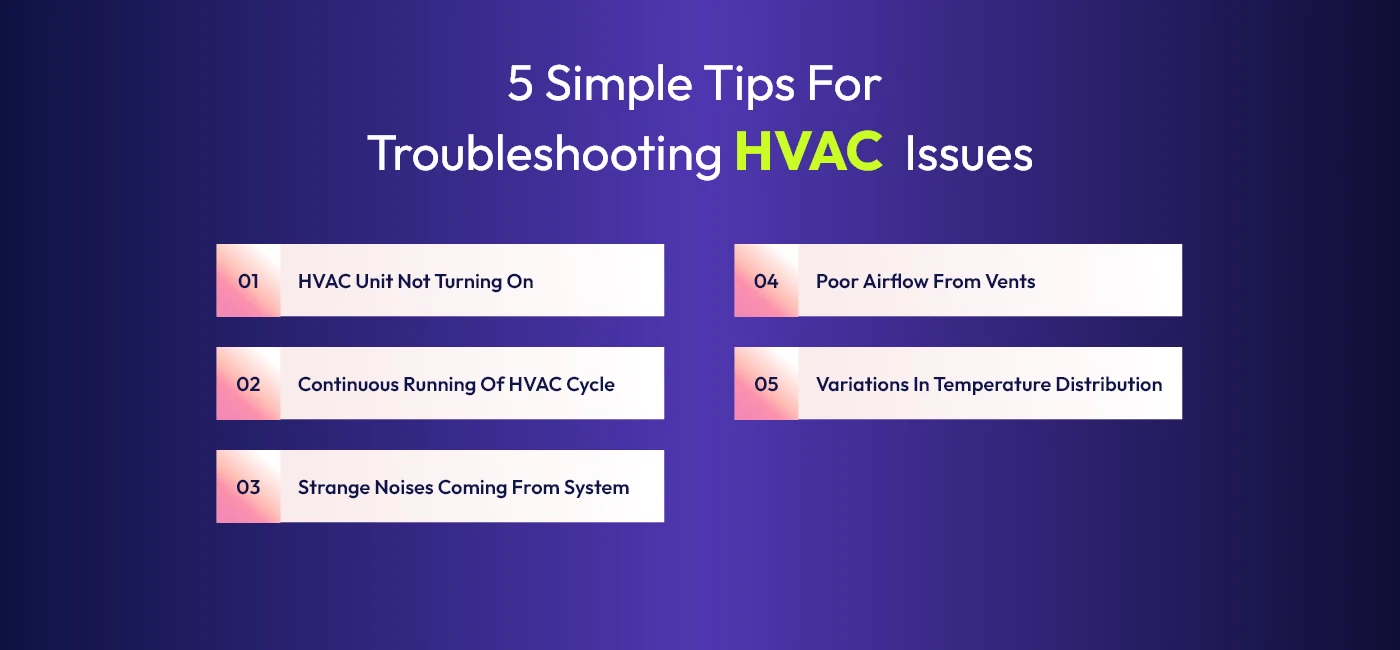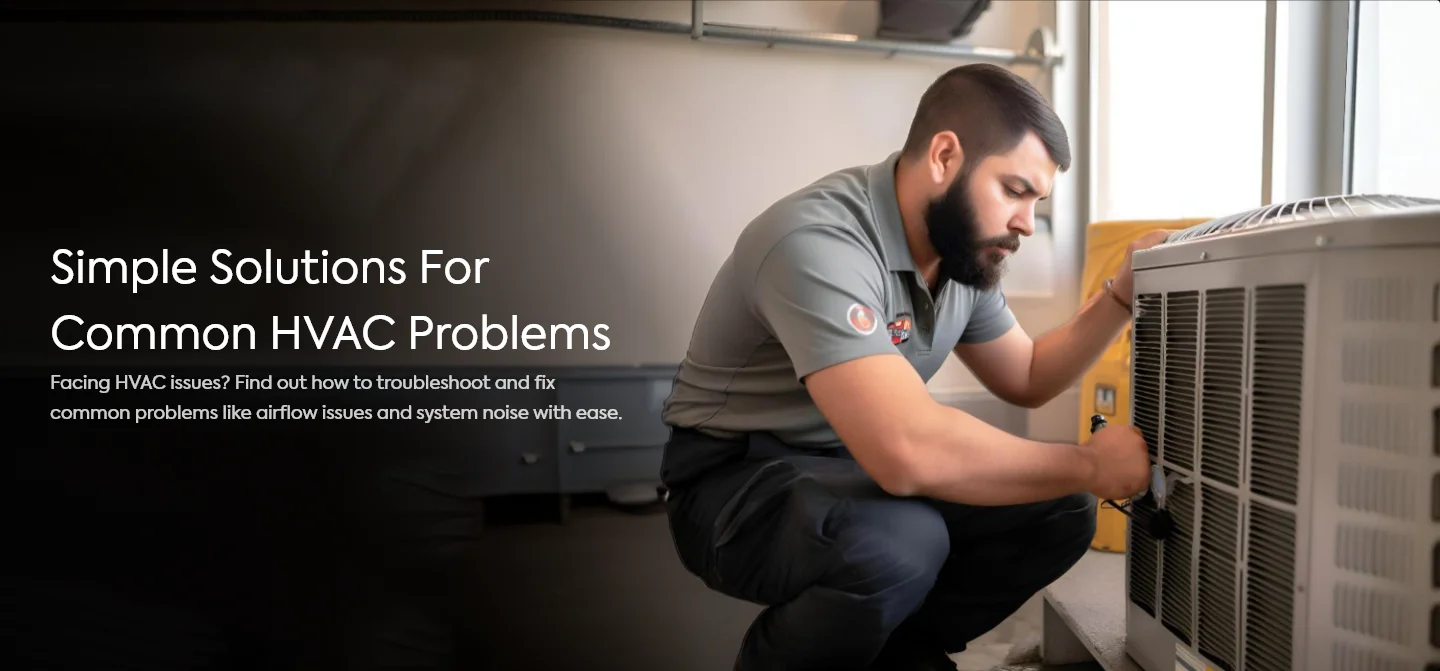HVAC (Heating, Ventilation, and Air Conditioning) systems are critical components of modern homes! From red-hot summer to chilly winter season, reliable HVAC systems are personal climate controllers, ensuring steady comfort within the homes.
However, HVAC units might face various issues including minor inconvenience and significant malfunction, which affect their overall efficiency and performance.
Efficient & regular HVAC system increase comfort at home and lower energy bills! Becoming skilled at troubleshooting HVAC issues can lead to significant time and cost savings. This post will guide you through typical HVAC issues and the best ways to fix them. Read below.
5 EASY Troubleshooting Tips for HVAC Problems

Don’t let HVAC issues collapse your day. Find out how to troubleshoot common AC issues quickly and easily. Check out our simple 5 tips to fix common HVAC problems. These tips help you save money and time, and keep you comfortable. Read below:
1. HVAC Unit Not Turning On
Is your home environment out of balance? Feeling the heat or the chill as your HVAC system is not working effectively? The most common HVAC issue is the system not turning on. It could be due to dead thermostat batteries or more serious, like wiring or electrical issues. To check it, you must try the steps mentioned below.
- Make sure that the thermostat is set at the right temperature. If required, you must replace its batteries.
- Check the power supply in the circuit system. Reset power or replace any blown fuses.
- Diagnose loosely coupled or damaged wires. Fix or replace them as needed.
2. Poor Airflow from Vents
Is your heating or cooling system troubling to keep up with weather conditions? It might be due to poor airflow from your vents. Simple fixes might get your cool or warm air flowing again. Do the following troubleshooting steps.
- Replace air filters every 1-3 months to keep airflow steady.
- Check ducts for blockages or damage and clean or repair them as needed.
- Make sure the fan is clean and working properly. Lubricate parts if needed.
3. Strange Noises Coming From System
Your HVAC unit speaks volumes – even through strange noises. These sounds might be warning signs of underlying issues. Get them checked and fixed to avoid future headaches.
- Grinding, banging, or screeching could indicate loose parts, you must tighten them.
- Ensure the fan blades are not bent or damaged. Clean the blades and check the motor for issues.
- If you suspect a refrigerant leak, contact a professional to inspect and repair the leak.
4. Continuous Running of HVAC Cycle
When the HVAC unit is running uninterruptedly and still not giving a room temperature, it denotes a potential problem and requires immediate attention. Overlooking this issue can lead to high energy bills and potential system damage, making prompt troubleshooting vital. Below are the steps to troubleshoot the issue.
- Inspect the thermostat if it is functioning well. Replace the system in case of any defect.
- Check refrigerant levels and refill refrigerant if needed.
- Regularly clean the evaporator and condenser coils to maintain efficiency.
5. Variations in Temperature Distribution
Frustrated with the difference in temperature and irregular airflow from your HVAC system? When your HVAC system gives irregular airflow, it affects the uniformity of temperature in your indoor space. Rooms may experience significant temperature swings, creating an inconsistent and uncomfortable climate. Follow the troubleshoot steps below.
- Check the size of the HVAC unit properly according to your home size.
- Inspect leaks and ensure ducts are properly insulated with duct sealants.
- Relocate the thermostat to a central location away from direct sunlight and drafts.
Call Good Guys to hire HVAC Experts
Leave it to experts if it is out of your comfort zone! Consult HVAC experts from Good Guys Home Services! The HVAC professionals at Good Guys can solve complex HVAC problems and keep your system run efficiently.
Moreover, proactive maintenance by Good Guys’ experts ensures optimal comfort, extends your HVAC’s life expectancy, and saves you money in the long run. To know more, visit our website or download the app.
You should change your HVAC air filter every 1 to 3 months. If you have pets or you live in a dusty area, you might need to change it more often to keep the air clean and the system running smoothly.
It’s a good to have your HVAC system serviced at least once a year, ideally before the heating or cooling season. Regular check-ups can help to catch small issues before they become big problem.
You can handle some simple tasks, like changing air filters or checking the thermostat. But for more complicated issues, it’s better to call a professional. They have the tools and expertise to fix problems without causing more damage.
You can improve efficiency by regularly changing air filters, keeping vents clear of obstructions, scheduling maintenance checks, and using a programmable thermostat to better control temperature settings.
No, unusual smells from your HVAC system can indicate a problem. A musty smell might suggest mold, while a burning smell could mean that there are some electrical issues. If you notice strange smell, it’s better to investigate as soon as possible.






